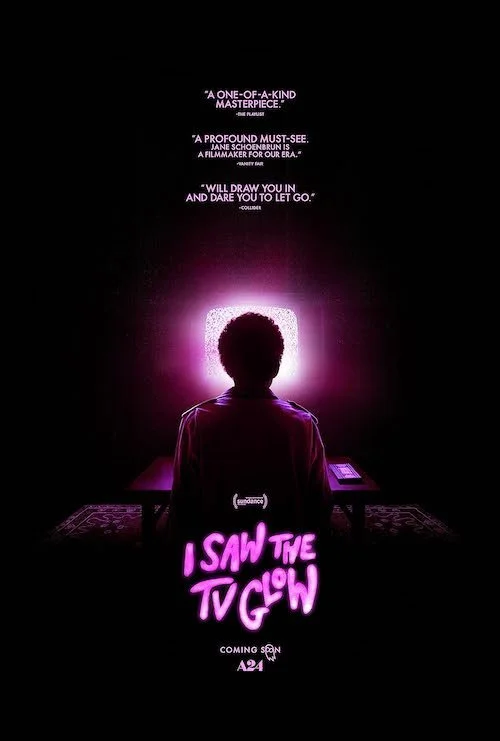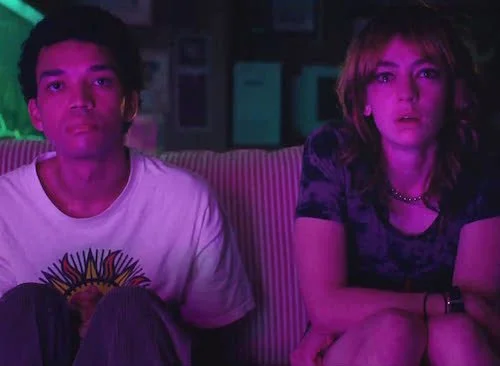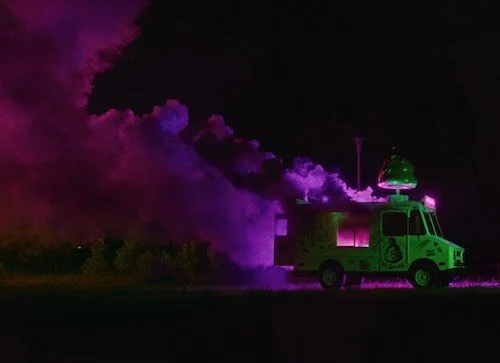I Saw the TV Glow
Written by Andreas Babiolakis
Who doesn’t love nostalgia? Actually, let me rephrase this. Who didn’t love nostalgia? The yearning for what came before the present moment? Those rose-coloured glasses that make our memories feel like highlight reels and all that we grew up with feel like pieces of ourselves? Nostalgia was once a much more powerful sensation because it made us feel connected to that which made us and our upbringings. We had to revisit that one film from yesteryear, recollect how that one great high school story went, and apologize to those hideous fashion trends that we once dismissed but now long for. That was then. We’re now nostalgic for the nostalgia that once was. We’re here at now, now. Nostalgia has been pushed by the commercial machine to the point of scrubbing any authenticity from it. We’re force-fed retro-feeling projects, many of which only revive the aesthetic tropes of decades or media without actually planting us back in these times with any legitimacy. There are some releases of any medium that handle nostalgia perfectly, as ghostly, bittersweet vehicles that have us questioning ourselves and our memories. Most releases don’t wish to go that far. It’s quite disheartening when even our memories and adulations with the past being the past are now capitalist angles. We’re getting robbed of our nostalgia as depictions of our current selves and our relationship with our provenances.
Jane Schoenbrun appears to be on the right side of this situation with their latest release, the highly anticipated indie film I Saw the TV Glow: a psychological, hypnagogic horror film that both praises and condemns the over-reliance on nostalgia as a treasure trove of comfort and a debilitating farce. Smothered in pinks, purples, and neon hazes, I Saw the TV Glow places us within the confinements of a television set for its ninety-minute runtime to the point that even these colours, of which we usually connect with nostalgia, now feel like warning flags that we cannot escape. As I Saw the TV Glow crawls at a pace that is induced by hypnotic slumber, we know what it feels like to be droned to a state of limbo by crippling dread and dependency. In a society where we are forever failing to meet expectations or keep up, we are now pressured by our entertainment in a similar fashion. You’re out of the loop if you don’t stay up to date with your favourite show. You don’t know who you are if you cannot identify with the feigned nostalgia that is deceptively meant to remind you of another decade (when, really, this is yet another tactic meant to milk a dying cow). You don’t matter unless we can make a buck off of you. Even your nostalgia is no longer safe.
I Saw the TV Glow never gets fully caught up in its own nostalgia, allowing for a stronger commentary on the misuse of the phenomenon.
This kind of lethargy is especially recognizable after that hell we all went through during the COVID-19 pandemic which is clearly also still fresh in Schoenbrun’s mind. The notion of slinking through empty stores, streets, and other environments continues to haunt me. Here, these ghost town landscapes are used to resemble the absent-minded lulling of those who are fixed to content. I Saw the TV Glow points a finger at television, but it’s really commenting on any form of consumption, be it cinema, video games, or — more contemporaneously — the social media that has us blasting blue light glares into our pupils from a close distance. I don’t blame us for getting fixated on the next episode, film, level, or post. We’re in desperate need of hiding from our realities when we are continuously bombarded with bad news, apocalyptic threats, and a dark cloud of a future that promises nothing but mortality and suffering. No wonder why we’re obsessed with looking backward.
I Saw the TV Glow focuses on Owen (Justice Smith): an introverted student who struggles to make friends or relate to his parents, his sick mother Brenda (Danielle Deadwyler) and his strict, gruff father (oddly enough, Fred Durst of Limp Bizkit fame). He notices a peer. Maddy (Brigette Lundy-Paine) with an episode guide for a television series called The Pink Opaque: a monster-of-the-week show where teenage supergirls Isabel and Tara overcome their fears and combat villain Mr. Melancholy and his army. Owen is hooked instantly, perhaps because he cannot articulate himself outside of this newly found passion and needs to escape his issues at home and in the classroom. By showing and not telling, Schoenbrun subliminally has another subplot going on throughout this film: a self-awareness that these characters are the product of their own fictional release. It seems obvious when Owen’s reality begins to merge with what he is seeing in The Pink Opaque (which is cleverly named after a release by dream pop sensation Cocteau Twins: another project that makes us feel like we’re in the state between being awake and asleep), but I Saw the TV Glow is also far more clever than this. It makes Owen’s life feel like it’s a part of The Pink Opaque from the jump, which is a far more damning and eerie situation when you really think about it. Like a properly made time travel film where you just see the latest outcome of history-altering circumstances, I Saw the TV Glow is just how we’re seeing the static purgatory and not the complete picture.
Jane Schoenbrun’s arresting film, I Saw the TV Glow, is a surreal look at the toxic traits of contemporary society.
I Saw the TV Glow dares to hop ahead by a few years at a time, making us feel like we’re missing episodes of our favourite show and simply cannot fathom how we are meant to continue with this missing information. It is so fixated on this The Pink Opaque circumstance that Owen’s life means nothing outside of the stranglehold that this television series has had on his life. That isn’t a writing mistake. That’s deliberate. We all know people who are defined by that one super passion they have and cannot stop talking about. If anything, we are that person to those we have briefly met and who were marked by that one discussion they had with us. There’s more to my life than death metal (I listen to all genres of music), films noir (again, I watch every genre of film), and the The Legend of Zelda franchise (that’s on me this time, with my large tattoo to commemorate the video game series), but to some that’s all they know about me. These are only parts of my personality. These don’t define me entirely, but they certainly do to some. This becomes especially true when you find comfort in something and have to circle back to it in order to keep this solace. We only know part of Owen’s story, but we aren’t given the opportunity to learn more because of how much purpose The Pink Opaque gives his life, even if it threatens his well-being.
Schoenbrun’s latest film feels like an answer to Peter Weir’s The Truman Show if the protagonist got sucked into the television series they were watching, or David Lynch’s Inland Empire regarding the inability to separate one’s self from the medium they chose to give them life (this is obviously a double-edged sword). It finally reminds me of another release and a far more recent one: Cindy Lee’s 2024 double album Diamond Jubilee, which is a two-hour collection of songs that feel like they are fading, audible apparitions of melodies from another decade (nay, another dimension); there’s something bittersweet about hearing beautiful music and experiencing the emptiness that time left them as they corrode in silence. I Saw the TV Glow also possesses this kind of void, but, as the title suggests, we feed on the glimpses of life — the glow of a television set — in order to keep going. We are dead on the inside. The static is our pulse. The glow is our spirit. The episode synopsis is our daily itinerary. We binge-watch shows to complete them, only to feast on another series so we have a purpose to wake up in the morning. As we see Owen’s life get taken over (and, in the latter sequences of the film, stymied to the point of societal paralysis), we recognize our own lack of growth in a civilization that condemns us for not being ahead of the pack. The horrors of I Saw the TV Glow are not blatant right away, but the lingering effect it will have on you will reveal its true nightmares. Our real lives are dull when they aren’t full of struggle, and our escapes are now synthetic. There is no way out.
Andreas Babiolakis has a Masters degree in Film and Photography Preservation and Collections Management from Toronto Metropolitan University, as well as a Bachelors degree in Cinema Studies from York University. His favourite times of year are the Criterion Collection flash sales and the annual Toronto International Film Festival.








